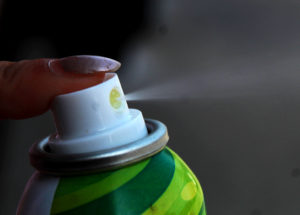West Nile virus and a hot summer

A woman using bug spray to keep away from mosquitoes in Windsor. Photo by Ashley Gholampoor.
A woman in Amherstburg is worried about the risk of contracting West Nile virus.
Danielle Dowhan, 21, said during the summer she gets between 20 and 30 mosquito bites because she spends a great deal of time outside. Dowhan said she worried she had the West Nile virus because of some symptoms she was experiencing.
“I had bad headaches and fevers. I went to the clinic and realized it was just a cold but it could have been anything,” said Dowhan.
According to the Government of Canada website, the virus has been found on four different occasions in Ontario this year. Dowhan said she thinks it has something to do with the hot weather during the summer. The first case of West Nile in Windsor was discovered in 2002.
“I have definitely seen a lot more mosquitoes this year than I did last summer. When it gets really hot and muggy outside that is when I see them the most,” said Dowhan.
A physician who has been in practice for more than 40 years has seen many cases where patients come in thinking they have the virus when they in fact do not.
Dr. Gary Ing, 68, is currently a family physician in LaSalle. He is the former chief of staff at Windsor Regional Hospital and knows quite a bit about the virus.
“There are two categories of symptoms: one is what we call non-neuro invasive, meaning no neurological symptoms,” said Ing. “Sometimes you get a bit of a fever, headaches, joint pain, fatigue, muscle aches, intestinal symptoms such as vomiting or diarrhea. Sometimes you will get a rash on your chest, back and arms.”
The second category of symptoms, called neuro invasive, are more complex and severe. These symptoms include, meningitis, cephalitis and flaccid paralysis. All of these symptoms affect the central nervous system.
According to Ing, up to 80 per cent of patients do not realize they have the virus because they have no symptoms.
“It is very hard to distinguish the non-neurological symptoms because they are very similar to any flu-like illness. You will have a fever, muscle aches and feel lousy. It can all be easily missed,” said Ing.
According to Ing, if someone is allergic to mosquitoes they will not be at a higher risk of getting infected by West Nile. To date, Ing says there is no vaccine to prevent the infection from happening and no vaccine to prevent the virus from entering the body.
“Unfortunately because there is no known treatment, you have to basically try and take precautionary measures,” said Ing. “In North America, there are so many cases, up to maybe 20,000 cases for West Nile. If you are traveling you need to know ahead if there is any West Nile activity happening in those areas.”
Ing said the peak time for mosquitoes is usually during the hot summer where puddles of standing water occur. To avoid getting infected by West Nile or any other insect bites, Ing suggests using insect repellent that contains DEET. He also recommends wearing clothes that cover extremities, for example a hat.
For further questions or to find out more about West Nile call the toll free number for the Windsor-Essex County Health Unit, 1-800-265-5822.


